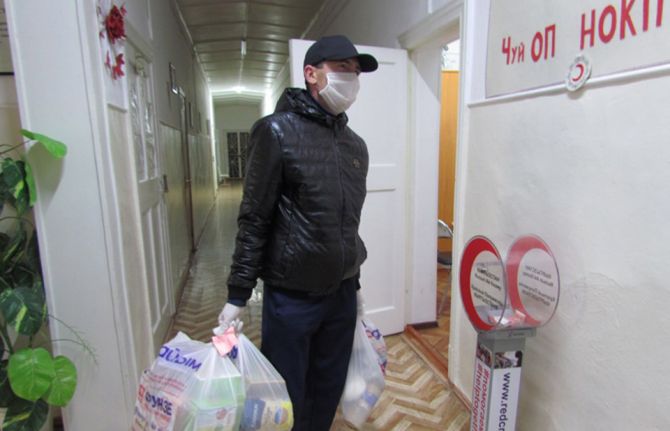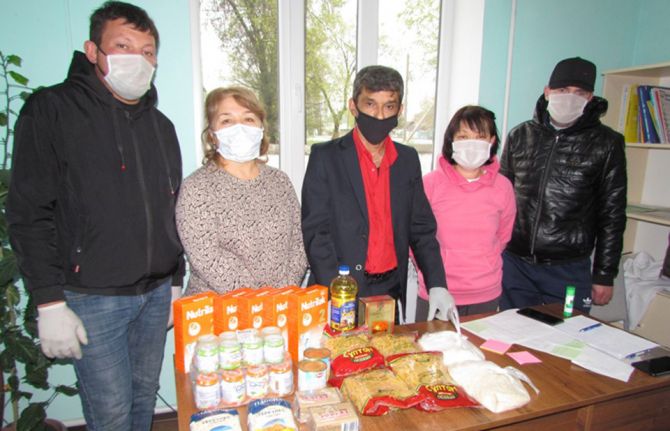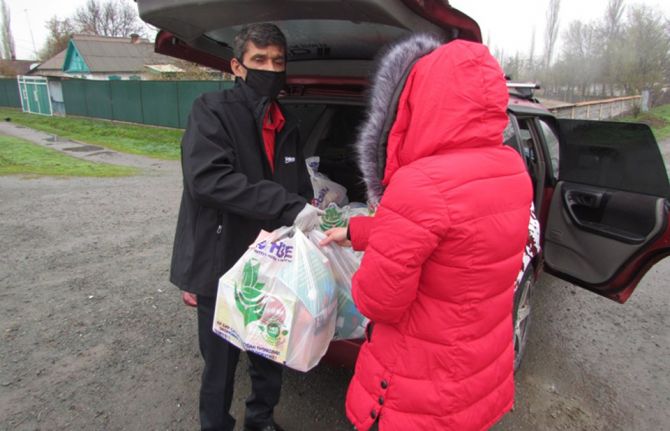



Feature Story
Helping people living with HIV with food supplies in Kyrgyzstan
27 April 2020
27 April 2020 27 April 2020Like most other countries, COVID-19 has not bypassed Kyrgyzstan—cases have been seen in the capital, Bishkek, and in almost all other major cities and provinces in the country.
In order to respond to the pandemic, a state of emergency was introduced on 25 March in Bishkek, Osh, Jalal-Abad and three districts, which restricts people to their home from 20:00 to 07:00 and allows people to leave their residence during the day only for a few specified reasons.
Like everyone else, people living with HIV in the country—UNAIDS estimates that there are 8500 people living with HIV in Kyrgyzstan—have faced a variety of challenges, including loss of earnings and difficulties in feeding their families.
In the small town of Karabalta, in the north of Kyrgyzstan, the HIV community organizations Believe in Yourself and the Country Network of Women Living with HIV work to promote the rights of people living with HIV. In the time of COVID-19, however, their services are even more in need.
Umid Shukurov, the Director of Believe in Yourself, explained that since the lockdown in Kyrgyzstan was announced, people living with HIV have got in contact with the organization in greater numbers. Access to food is a major concern for many. “Many people call us in despair, women cry and ask for help. Of course, we help in every way possible, but our resources are limited. When we, together with the Country Network of Women Living with HIV, compiled a list, we realized that 12 women living in our small town are in a distressed situation. Some of them have recently become mothers or are raising their children alone. Yesterday, we distributed food packages and some women could not believe that someone had reached them and brought them some food. The asked me, “Is it real that someone has heard us?”’’
Baktygul Shukurova, the Director of the Country Network of Women Living with HIV, knew that the network would face various problems after it was set up, but never thought that the problems would be of this magnitude. “Our task is to keep people on antiretroviral therapy. I have been through difficult situations in life myself and I know how difficult it can be when you simply have nothing to feed your children with. Only a person who has been through all this can understand the needs of communities. When you and your children have nothing to eat, you don’t care about the medication.”
Access to antiretroviral therapy is being ensured in the country by the provision of mulitimonth dispensing of medicines. During the COVID-19 pandemic, the national AIDS centre in Kyrgyzstan will be providing three-month supplies of antiretroviral therapy to all people living with HIV who are on treatment.
The UNAIDS Country Office in Kyrgyzstan, with the support of a Russian technical assistance programme, is organizing the delivery of food packages, which will supplement other social assistance available for people living with HIV, to 130 families of people living with HIV who have been the most affected by their loss of earnings. Apart from the food, the packages also contain colouring books, marker pens and watercolour sets for the children of people living with HIV, to help them get through the lockdown.
“We hope that this small help will go some way to enabling people living with HIV to remain on treatment,” said Meerim Sarybaeva, the UNAIDS Country Manager for Kyrgyzstan.
Our work
Region/country
Related
 Women, HIV, and war: a triple burden
Women, HIV, and war: a triple burden

12 September 2025
 Displacement and HIV: doubly vulnerable in Ukraine
Displacement and HIV: doubly vulnerable in Ukraine

11 August 2025

